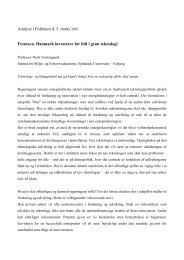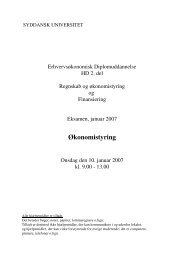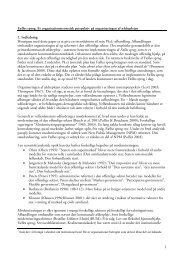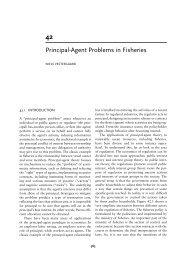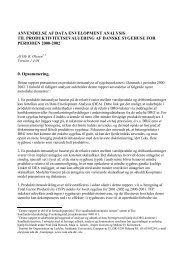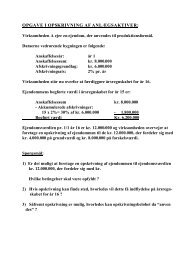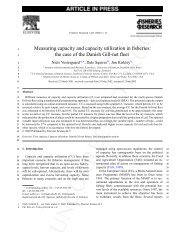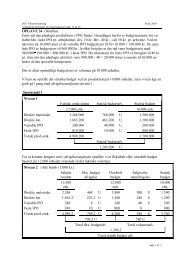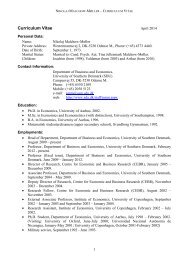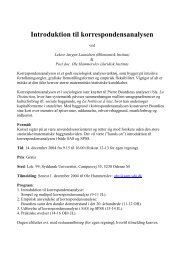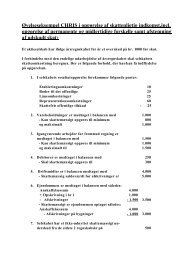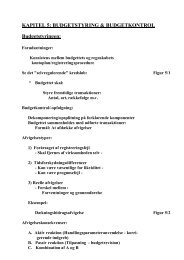Development of Parties and Party Systems in ... - lah@sam.sdu.dk
Development of Parties and Party Systems in ... - lah@sam.sdu.dk
Development of Parties and Party Systems in ... - lah@sam.sdu.dk
- No tags were found...
You also want an ePaper? Increase the reach of your titles
YUMPU automatically turns print PDFs into web optimized ePapers that Google loves.
are <strong>of</strong>ten discussed <strong>in</strong> “relaxed” <strong>and</strong> “practical” ways. From the outset The Four-Coalition (4K) <strong>in</strong>the Czech Republic <strong>and</strong> ”Przymierze Polski” <strong>in</strong> Pol<strong>and</strong> constituted such ”pure” tactical partyformationsas they were not dist<strong>in</strong>ct negative alliances <strong>and</strong> party federations such as <strong>in</strong> case <strong>of</strong> AWS<strong>and</strong> SDK. However, before the 2002 election 4K tried to be transformed itself <strong>in</strong>to a party alliancewith a common election program <strong>and</strong> a “shadow cab<strong>in</strong>et”. However, after the victory at the firstnational elections <strong>and</strong> after the transformation <strong>in</strong>to party federations, several “wars <strong>in</strong> the top”erupted.Inside dysfunctional party alliances are not kept together primarily be references to the common”enemy”, e.g. ”post-communists” (e.g. SLD <strong>in</strong> Pol<strong>and</strong>) or “nationalists” (e.g. Meciar <strong>in</strong> Slovakia).In most cases lack <strong>of</strong> loyalty <strong>and</strong> cohesion on actor level has been strik<strong>in</strong>g. On the Polish Rightseveral policians changed party four or five times. In the case <strong>of</strong> SLD <strong>in</strong> Pol<strong>and</strong> the transformationto a party-alliance <strong>and</strong> later unified ”st<strong>and</strong>ard party” became the expressed goal, <strong>in</strong> other cases n<strong>of</strong><strong>in</strong>al decision was taken, e.g. <strong>in</strong> case <strong>of</strong> the Czech ”Four Coalition” (4K) <strong>and</strong> ”Przymierze Polski”<strong>in</strong> Pol<strong>and</strong>. To conclude, the ultimate aim <strong>of</strong> functional party alliances tends to be to establishfunctional party federations <strong>and</strong> <strong>in</strong> the longer term to be transformed <strong>in</strong>to unified “st<strong>and</strong>ard” parties.However, most political groups tend to regard party alliances as only tactical <strong>and</strong> thereforetemporary. Thus, from the outset the lack <strong>of</strong> loyalty <strong>and</strong> cohesion on the elite level has beenstrik<strong>in</strong>g.1.10. <strong>Parties</strong> <strong>and</strong> party systems under presidentialism<strong>Parties</strong> <strong>and</strong> party systems tend to develop differently <strong>in</strong> presidential <strong>and</strong> parliamentary systems.<strong>Party</strong> non-systems <strong>and</strong> weak party systems seem to create presidential or semi-presidential systems,as strong presidents, who are act<strong>in</strong>g “above politics”, may “compensate” for absence <strong>of</strong> strong <strong>and</strong>legitimate parties. In order to strengthen their own position presidents sometimes strived to set upbarriers for development <strong>of</strong> new parties such as was the case e.g. <strong>in</strong> Russia, Ukra<strong>in</strong>e <strong>and</strong> Pol<strong>and</strong> atthe beg<strong>in</strong>n<strong>in</strong>g <strong>of</strong> the 1990’s.Thus, evidence show that presidential systems tend to weaken the political parties <strong>and</strong> thedemocratic process. Presidential systems seem rigid, as it is almost impossible to change thepresident <strong>in</strong> mid-term without br<strong>in</strong>g<strong>in</strong>g down the regime itself (Sakwa, 2002:104). The presidentialveto <strong>and</strong> the reference <strong>of</strong> laws to the constitutional courts have hampered or <strong>of</strong>ten delayed thedecision processes. The problem has been the greatest, when elected governments were deniedf<strong>in</strong>ancial laws <strong>and</strong> tax laws already adopted by a majority <strong>in</strong> parliament. The disagreements amongparties <strong>and</strong> “wars <strong>in</strong> the top” <strong>in</strong>side parties before presidential elections suggest that direct election<strong>of</strong> presidents re<strong>in</strong>force party fragmentation <strong>and</strong> impair further stabilization <strong>and</strong> crystallization <strong>of</strong>party systems.In Slovakia the realisation <strong>and</strong> disagreements between President Michal Kovac <strong>and</strong> Prime M<strong>in</strong>isterVladimir Meciar clearly underm<strong>in</strong>ed the democratic process <strong>and</strong> gave rise to a heavily polarizedpolitical system. Both president Vaclav Havel <strong>in</strong> the Czech Republic <strong>and</strong> president Lech Walesa <strong>in</strong>Pol<strong>and</strong> criticized the behaviour <strong>of</strong> the political parties <strong>in</strong> general <strong>and</strong> thereby raised questions aboutthe role <strong>of</strong> the political parties for the further consolidation <strong>of</strong> the new won democracy(”antipolitics”). The election <strong>of</strong> Vaclav Klaus as new president <strong>of</strong> the Czech Republic signified amove away from the “anti-politics” civic based, altlanctic <strong>and</strong> pro-European l<strong>in</strong>e <strong>of</strong> formerpresident Vaclav Havel.29



